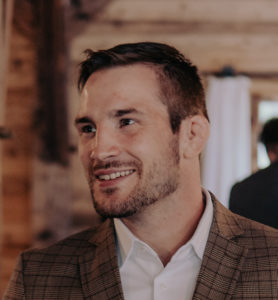COORDINATOR
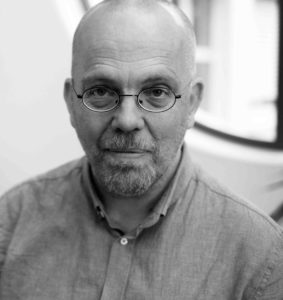 Dr. Jan Alexandersson is a Principal Researcher and Research Fellow at the Intelligent User Interfaces lab at the German Research Institute of Artificial Intelligence, DFKI GmbH. He received his Master of Science from the University of Linköping in 1993 and has published more than 90 peer-reviewed papers, book chapters, proceedings etc. He has been working since 1993 at DFKI on topics like spoken language translation (Project VerbMobi), multimodal human-computer interaction (Project SmartKom, Metalogue), Corpus and Summarization (Projects AMI/AMIDA) and recently, assistive and accessible technology for the elderly and persons with disabilities (projects i2home & VITAL, Mobia, mobisaar, SIforAGE, SensHome). He defended his PhD in 2003 at the University of the Saarland. He is head of the DFKI Competence Center for Ambient Assisted Living and president of the OpenURC alliance.
Dr. Jan Alexandersson is a Principal Researcher and Research Fellow at the Intelligent User Interfaces lab at the German Research Institute of Artificial Intelligence, DFKI GmbH. He received his Master of Science from the University of Linköping in 1993 and has published more than 90 peer-reviewed papers, book chapters, proceedings etc. He has been working since 1993 at DFKI on topics like spoken language translation (Project VerbMobi), multimodal human-computer interaction (Project SmartKom, Metalogue), Corpus and Summarization (Projects AMI/AMIDA) and recently, assistive and accessible technology for the elderly and persons with disabilities (projects i2home & VITAL, Mobia, mobisaar, SIforAGE, SensHome). He defended his PhD in 2003 at the University of the Saarland. He is head of the DFKI Competence Center for Ambient Assisted Living and president of the OpenURC alliance.
BERLIN
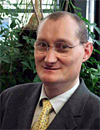 Dr. Norbert Reithinger is a Principal Researcher and Research Fellow at DFKI and responsible for various projects in the area of multimodal interfaces for public and private customers. He is also office director of the recently established office of DFKI in Berlin. He was a scientific coordinator for projects like Verbmobil, SmartKom, VirtualHuman and SmartWeb. Currently, he is coordinator of all DFKI activities in the German large scale AAL-project SmartSenior. In this project, he is also responsible for the subproject covering usability and end-user evaluation.
Dr. Norbert Reithinger is a Principal Researcher and Research Fellow at DFKI and responsible for various projects in the area of multimodal interfaces for public and private customers. He is also office director of the recently established office of DFKI in Berlin. He was a scientific coordinator for projects like Verbmobil, SmartKom, VirtualHuman and SmartWeb. Currently, he is coordinator of all DFKI activities in the German large scale AAL-project SmartSenior. In this project, he is also responsible for the subproject covering usability and end-user evaluation.
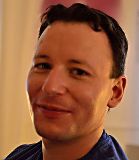 Aaron Ruß graduated in Computer Science at the Philipps-University Marburg in 2007. Since 2009, he works as Researcher at the German Research Center for Artificial Intelligence (DFKI) in the Department for Intelligent User Interfaces (IUI). His research focuses on user modeling in context of simulation-based, automated user evaluation. His work in AAL projects focused on the area of automated usability evaluation, user modeling with emphasis on age related effects and disabilities, and development of multimodal interfaces.
Aaron Ruß graduated in Computer Science at the Philipps-University Marburg in 2007. Since 2009, he works as Researcher at the German Research Center for Artificial Intelligence (DFKI) in the Department for Intelligent User Interfaces (IUI). His research focuses on user modeling in context of simulation-based, automated user evaluation. His work in AAL projects focused on the area of automated usability evaluation, user modeling with emphasis on age related effects and disabilities, and development of multimodal interfaces.
 Kinga Schumacher graduated in Computer Science at the University of Mannheim. Since June 2006, she works as a researcher at the DFKI. Her research projects are focussing on intelligent information management systems (semantic information analysis/processing and retrieval), including user interfaces and interaction design as well as backend technologies. In the AAL domain, she was involved in the national government funded project SmartSenior. Kinga Schumacher’s current research activities concern the development of styleguides and the design of multimodal interaction for the generation 60+ (LeVer), and semantic information processing for the same user group (PLuTO).
Kinga Schumacher graduated in Computer Science at the University of Mannheim. Since June 2006, she works as a researcher at the DFKI. Her research projects are focussing on intelligent information management systems (semantic information analysis/processing and retrieval), including user interfaces and interaction design as well as backend technologies. In the AAL domain, she was involved in the national government funded project SmartSenior. Kinga Schumacher’s current research activities concern the development of styleguides and the design of multimodal interaction for the generation 60+ (LeVer), and semantic information processing for the same user group (PLuTO).
 Sven Schmeier is a Senior Consultant at DFKI and works in several projects in the area of language technology. Furthermore he is the CTO of the DFKI spin-off “Yocoy”. In SmartSenior he is responsible for the subproject “Overcoming language barriers”.
Sven Schmeier is a Senior Consultant at DFKI and works in several projects in the area of language technology. Furthermore he is the CTO of the DFKI spin-off “Yocoy”. In SmartSenior he is responsible for the subproject “Overcoming language barriers”.
BREMEN
 Prof. Dr. Bernd Krieg-Brückner (M.S. in Computer Science, Cornell University, 1971; Dr. rer. nat, TU München, 1978) was a principal contributor to the design of the programming language ADA. After a stay at UC Berkeley and Stanford University, he became a professor at Universität Bremen in 1982. Since 2005, he has been director of the Research Department on Safe and Secure Cognitive Systems of the German Research Center for Artificial Intelligence (DFKI) at Bremen. His research has concentrated, on the one hand, on the development of formal languages, methods, and tools for the development of correct software as a basis for abstraction and reuse of formal developments, and safety and security. Since 1990, formal specification, formal ontology, and formal safety have been applied to cognitive science, robotics, and Ambient Assisted Living, now in the DFG-funded Transregional Collaborative Research Center SFB/TR 8 Spatial Cognition.
Prof. Dr. Bernd Krieg-Brückner (M.S. in Computer Science, Cornell University, 1971; Dr. rer. nat, TU München, 1978) was a principal contributor to the design of the programming language ADA. After a stay at UC Berkeley and Stanford University, he became a professor at Universität Bremen in 1982. Since 2005, he has been director of the Research Department on Safe and Secure Cognitive Systems of the German Research Center for Artificial Intelligence (DFKI) at Bremen. His research has concentrated, on the one hand, on the development of formal languages, methods, and tools for the development of correct software as a basis for abstraction and reuse of formal developments, and safety and security. Since 1990, formal specification, formal ontology, and formal safety have been applied to cognitive science, robotics, and Ambient Assisted Living, now in the DFG-funded Transregional Collaborative Research Center SFB/TR 8 Spatial Cognition.
 Dr. Serge Autexier is a Senior Researcher in the research department on Cyber-Physical Systems of the German Research Center for Artificial Intelligence (DFKI GmbH) in Bremen. He obtained his Diploma in Computer Science (~ M.Sc.) in 1996 and his doctoral degree (Dr.-Ing.) in 2003, both from Saarland University in Saarbrücken, Germany. His background is in formal methods, mathematical and formal logic, especially automated and interactive theorem providing, and change analysis, change propagation and change management for linked, semi-structured data (project FormalSafe). More recently he worked on the formalisation and implementation of processes integrating heterogeneous services with rich data which resulted in an implementation, simulation, and execution platform of assistance services for the Bremen Ambient Assisted Living Lab (BAALL).
Dr. Serge Autexier is a Senior Researcher in the research department on Cyber-Physical Systems of the German Research Center for Artificial Intelligence (DFKI GmbH) in Bremen. He obtained his Diploma in Computer Science (~ M.Sc.) in 1996 and his doctoral degree (Dr.-Ing.) in 2003, both from Saarland University in Saarbrücken, Germany. His background is in formal methods, mathematical and formal logic, especially automated and interactive theorem providing, and change analysis, change propagation and change management for linked, semi-structured data (project FormalSafe). More recently he worked on the formalisation and implementation of processes integrating heterogeneous services with rich data which resulted in an implementation, simulation, and execution platform of assistance services for the Bremen Ambient Assisted Living Lab (BAALL).
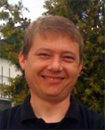 Dr. Thomas Röfer received a Diploma in computer science and Dr. Ing. from Universität Bremen, Germany, in 1993 and 1998, respectively. He is a member of the Transregional Collaborative Research Center SFB/TR 8 “Spatial Cognition” at Bremen, funded by the Deutsche Forschungsgemeinschaft (DFG), and of the Executive Committee of the RoboCup Federation. He is currently Senior Researcher at the German Research Center for Artificial Intelligence (DFKI) in the Research Department on Safe and Secure Cognitive Systems at Bremen, Germany. His research interests include rehabilitation robotics, robot soccer, real-time computer vision, world modeling, and humanoid robots.
Dr. Thomas Röfer received a Diploma in computer science and Dr. Ing. from Universität Bremen, Germany, in 1993 and 1998, respectively. He is a member of the Transregional Collaborative Research Center SFB/TR 8 “Spatial Cognition” at Bremen, funded by the Deutsche Forschungsgemeinschaft (DFG), and of the Executive Committee of the RoboCup Federation. He is currently Senior Researcher at the German Research Center for Artificial Intelligence (DFKI) in the Research Department on Safe and Secure Cognitive Systems at Bremen, Germany. His research interests include rehabilitation robotics, robot soccer, real-time computer vision, world modeling, and humanoid robots.
 Prof. Dr.-Ing. Udo Frese is assistant professor for real time computer vision at University of Bremen since June 2008. He is principal investigator in the Transregional Collaborative Research Center Spatial Cognition – Reasoning, Action, Interaction. He is affiliated with the German Center for Artificial Intelligence (DFKI). Udo Frese has studied computer science in Paderborn and then worked as a researcher at the German Aerospace Center (DLR). He received his Ph.D. from Friedrich-Alexander-University Erlangen-Nürnberg. His thesis presented treemap, a highly efficient algorithm for simultaneous localization and mapping (SLAM), i.e. for estimating global maps from local observations. After that he worked as a senior researcher at University of Bremen and at the DFKI. Udo Frese’s area of interest is real time computer vision and robotics. Possible applications are industrial quality assurance, creating 3D models of an environment with a moving camera, or visual perception in sport robotics. Udo Frese is also working in the field of safety related algorithms processing sensor data, such as collision avoidance of autonomous ground vehicles.
Prof. Dr.-Ing. Udo Frese is assistant professor for real time computer vision at University of Bremen since June 2008. He is principal investigator in the Transregional Collaborative Research Center Spatial Cognition – Reasoning, Action, Interaction. He is affiliated with the German Center for Artificial Intelligence (DFKI). Udo Frese has studied computer science in Paderborn and then worked as a researcher at the German Aerospace Center (DLR). He received his Ph.D. from Friedrich-Alexander-University Erlangen-Nürnberg. His thesis presented treemap, a highly efficient algorithm for simultaneous localization and mapping (SLAM), i.e. for estimating global maps from local observations. After that he worked as a senior researcher at University of Bremen and at the DFKI. Udo Frese’s area of interest is real time computer vision and robotics. Possible applications are industrial quality assurance, creating 3D models of an environment with a moving camera, or visual perception in sport robotics. Udo Frese is also working in the field of safety related algorithms processing sensor data, such as collision avoidance of autonomous ground vehicles.
KAISERSLAUTERN
 Gabriele Bleser is senior researcher at the department Augmented Vision at the German Research Center for Artificial Intelligence (DFKI) in Kaiserslautern, Germany. Before (2004-2008) she worked in the department Virtual and Augmented Reality at the Fraunhofer Institute for Computer Graphics in Darmstadt, Germany. She received her Ph.D. (Towards Visual-Inertial SLAM for Mobile Augmented Reality) from the University Kaiserslautern in March 2009. Her thesis presents methods for model-based visual-inertial camera tracking and visual-inertial SLAM using the extended Kalman filter, the particle filter and the Rao-Blackwellised particle filter. She is currently working in the European research project PAMAP (Physical Activity Monitoring for Aging People), where low-cost inertial sensors are used to monitor the physical activity of elderly people, and in the European research project COGNITO (Cognitive Workflow Capturing and Rendering with On-Body Sensor-Networks, ICT – 248290), where she investigates user activity monitoring and workflow recognition based on a network of inertial sensors and cameras.
Gabriele Bleser is senior researcher at the department Augmented Vision at the German Research Center for Artificial Intelligence (DFKI) in Kaiserslautern, Germany. Before (2004-2008) she worked in the department Virtual and Augmented Reality at the Fraunhofer Institute for Computer Graphics in Darmstadt, Germany. She received her Ph.D. (Towards Visual-Inertial SLAM for Mobile Augmented Reality) from the University Kaiserslautern in March 2009. Her thesis presents methods for model-based visual-inertial camera tracking and visual-inertial SLAM using the extended Kalman filter, the particle filter and the Rao-Blackwellised particle filter. She is currently working in the European research project PAMAP (Physical Activity Monitoring for Aging People), where low-cost inertial sensors are used to monitor the physical activity of elderly people, and in the European research project COGNITO (Cognitive Workflow Capturing and Rendering with On-Body Sensor-Networks, ICT – 248290), where she investigates user activity monitoring and workflow recognition based on a network of inertial sensors and cameras.
SAARBRÜCKEN
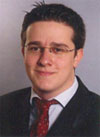 Andreas Emrich is researcher and PhD candidate at the Institute for Information Systems (IWi) at the German Research Center for Artificial Intelligence (DFKI). He received a Master’s Degree in Business Administration and Computer Science (“Dipl.-Wirtsch.-Ing.) from the University of Kaiserslautern in 2008. His research interests are mobile (health) recommender systems, semantic web and information traceability. He led several local, national and international research und industry projects and co-authored more than 30 peer-reviewed papers. Currently, Andreas Emrich is project leader of MENTORbike.
Andreas Emrich is researcher and PhD candidate at the Institute for Information Systems (IWi) at the German Research Center for Artificial Intelligence (DFKI). He received a Master’s Degree in Business Administration and Computer Science (“Dipl.-Wirtsch.-Ing.) from the University of Kaiserslautern in 2008. His research interests are mobile (health) recommender systems, semantic web and information traceability. He led several local, national and international research und industry projects and co-authored more than 30 peer-reviewed papers. Currently, Andreas Emrich is project leader of MENTORbike.
 Dr. Andrey Girenko is R&D Administrator at the Competence Centre for eLearning Technologies of the DFKI (since 2008). He also provides EU management services to the Intelligent User Interfaces Department. Currently, he is directly involved in SIforAGE and METALOGUE projects. He is also Managing Director of the GIRAF PM Services GmbH. Dr. Girenko has a HE diploma in Computer aided Management Systems (CAMS) from the Higher Military School of Radio-Technical Engineering in Kiev (Ukraine) and a Candidate of Science (equivalent of PhD) (Computer Science) from the Higher Military Academy of Radio-Technical Engineering in Kharkov (Ukraine). After a stay at the Tver State University, Russia, as the Vice-Director of the University Internet Centre (1993-1995) and as the Head of International Relations (1995-2001) and after being a Senior Expert of the National Training Foundation (NFT) in Moscow, Russia, he joined the DFKI for the first time in 2002 to manage a flagship Thematic Network Agentcities.NET. From August 2001 to October 2008, he also managed/coordinated or participated in more than 20 European projects for the European Research and Project Office EURICE. The most recent or most significant projects in this field are LeActiveMath, K4Care, ENGAGE, Coeur4Life.
Dr. Andrey Girenko is R&D Administrator at the Competence Centre for eLearning Technologies of the DFKI (since 2008). He also provides EU management services to the Intelligent User Interfaces Department. Currently, he is directly involved in SIforAGE and METALOGUE projects. He is also Managing Director of the GIRAF PM Services GmbH. Dr. Girenko has a HE diploma in Computer aided Management Systems (CAMS) from the Higher Military School of Radio-Technical Engineering in Kiev (Ukraine) and a Candidate of Science (equivalent of PhD) (Computer Science) from the Higher Military Academy of Radio-Technical Engineering in Kharkov (Ukraine). After a stay at the Tver State University, Russia, as the Vice-Director of the University Internet Centre (1993-1995) and as the Head of International Relations (1995-2001) and after being a Senior Expert of the National Training Foundation (NFT) in Moscow, Russia, he joined the DFKI for the first time in 2002 to manage a flagship Thematic Network Agentcities.NET. From August 2001 to October 2008, he also managed/coordinated or participated in more than 20 European projects for the European Research and Project Office EURICE. The most recent or most significant projects in this field are LeActiveMath, K4Care, ENGAGE, Coeur4Life.
 PD Dr. Matthias Klusch is Senior Researcher and Research Fellow of the German Research Center for Artificial Intelligence (DFKI) where he is Co-Head of the research group on multi-agent systems. He is also Adjunct Professor at the Swinburne University of Technology in Melbourne (Australia). He received his MSc (1992) and PhD (1997) from the University of Kiel, and his Habilitation (2009) in computer science from the University of the Saarland, Germany. He was nominee for the ACM SIGART 2008 Award for Excellence in Autonomous Agent Research. Among others, he is associate editor of the international journals of Web Semantics, Cooperative Information Systems, Semantic Web and Information Systems, Web Intelligence and Agent Systems, and Applied Decision Sciences. He co-/authored 27 books, and published about 120 papers in these domains. In the AAL domain, he has been scientific coordinator of the European funded STREP CASCOM, the national government funded project SCALLOPS, and is involved in the regional initiative SaarAAL.
PD Dr. Matthias Klusch is Senior Researcher and Research Fellow of the German Research Center for Artificial Intelligence (DFKI) where he is Co-Head of the research group on multi-agent systems. He is also Adjunct Professor at the Swinburne University of Technology in Melbourne (Australia). He received his MSc (1992) and PhD (1997) from the University of Kiel, and his Habilitation (2009) in computer science from the University of the Saarland, Germany. He was nominee for the ACM SIGART 2008 Award for Excellence in Autonomous Agent Research. Among others, he is associate editor of the international journals of Web Semantics, Cooperative Information Systems, Semantic Web and Information Systems, Web Intelligence and Agent Systems, and Applied Decision Sciences. He co-/authored 27 books, and published about 120 papers in these domains. In the AAL domain, he has been scientific coordinator of the European funded STREP CASCOM, the national government funded project SCALLOPS, and is involved in the regional initiative SaarAAL.
 Dr. Oliver Keller graduated from Saarland University, Germany in 1993 and defended his PHD in 1997. Between 1997 and 1998 he was working for a SpinOff company in the field of non-destructive material-testing and since autumn 1998 he is working at DFKI as research department administrator (Research Department Deduction and Multi-Agent Systems until spring 2008 and Research Department Agents and Simulated Reality until today). Additionally he is the leader of the IT-security testing facility at DFKI. Dr. Keller was involved in the preparation and negotiation in various European RTD-projects and was the Co-ordinator of European funded STREP projects in the field of e-inclusion and AAL (511632 CASCOM, 030600 VITAL).
Dr. Oliver Keller graduated from Saarland University, Germany in 1993 and defended his PHD in 1997. Between 1997 and 1998 he was working for a SpinOff company in the field of non-destructive material-testing and since autumn 1998 he is working at DFKI as research department administrator (Research Department Deduction and Multi-Agent Systems until spring 2008 and Research Department Agents and Simulated Reality until today). Additionally he is the leader of the IT-security testing facility at DFKI. Dr. Keller was involved in the preparation and negotiation in various European RTD-projects and was the Co-ordinator of European funded STREP projects in the field of e-inclusion and AAL (511632 CASCOM, 030600 VITAL).
 Dr. Klaus Fischer studied computer science at the Technische Universität (TU) in München. From 1986 to 1991 he worked in a joint research project SFB 331 Information Procssing in Autonomous Mobile Robot Systems at the Department of Computer Science at the TU München. In 1992 he finished his doctoral degree with his thesis on Distributed and Cooperative Planning in a Flexible Manufacturing System. In January 1992 he joined the Multiagent System Research Group at DFKI GmbH in Saarbrücken in the department of Deduction and Multiagent Systems headed by Prof. H. J. Siekmann and assumed the responsibility of group leader in 1993, and deputy head of department in 1996. He has successfully finished several research projects and industrial application projects on multiagent systems. Since 1989 he has been a member of the German Special Interest Group on Distributed AI of which he was spokesman from 1995 to 2000. In the AAL domain, Dr. Fischer is involved in the European funded STREPs i2home and VITAL.
Dr. Klaus Fischer studied computer science at the Technische Universität (TU) in München. From 1986 to 1991 he worked in a joint research project SFB 331 Information Procssing in Autonomous Mobile Robot Systems at the Department of Computer Science at the TU München. In 1992 he finished his doctoral degree with his thesis on Distributed and Cooperative Planning in a Flexible Manufacturing System. In January 1992 he joined the Multiagent System Research Group at DFKI GmbH in Saarbrücken in the department of Deduction and Multiagent Systems headed by Prof. H. J. Siekmann and assumed the responsibility of group leader in 1993, and deputy head of department in 1996. He has successfully finished several research projects and industrial application projects on multiagent systems. Since 1989 he has been a member of the German Special Interest Group on Distributed AI of which he was spokesman from 1995 to 2000. In the AAL domain, Dr. Fischer is involved in the European funded STREPs i2home and VITAL.
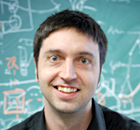 Ingo Zinnikus is Researcher at the German Research Center for Artificial Intelligence (DFKI). He graduated from the Saarland University, Germany in 1998 and is since then working in the Multiagent Systems group of DFKI. He has been working on the application of multiagent systems for a number of topics such as logistics, recommendation systems and business process execution. Besides numerous publications he has contributed to a number of successful national and European projects. He served as program committee member for a number of international workshops. Fields of Interest: Multiagent systems, service-oriented architectures and Semantic Web services. Experience with projects: the German government funded project TeleTruck, the EU funded projects SAID (FP5), VITAL (FP6, Technical Coordination), ATHENA (FP 6), and COIN (FP7), as well as regional industry projects.
Ingo Zinnikus is Researcher at the German Research Center for Artificial Intelligence (DFKI). He graduated from the Saarland University, Germany in 1998 and is since then working in the Multiagent Systems group of DFKI. He has been working on the application of multiagent systems for a number of topics such as logistics, recommendation systems and business process execution. Besides numerous publications he has contributed to a number of successful national and European projects. He served as program committee member for a number of international workshops. Fields of Interest: Multiagent systems, service-oriented architectures and Semantic Web services. Experience with projects: the German government funded project TeleTruck, the EU funded projects SAID (FP5), VITAL (FP6, Technical Coordination), ATHENA (FP 6), and COIN (FP7), as well as regional industry projects.
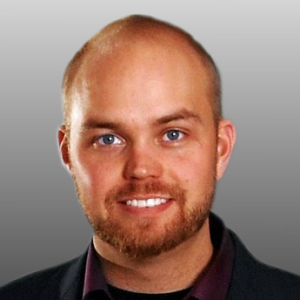 Jochen Britz is a Researcher at the German Research Center for Artificial Intelligence (DFKI). He graduated in Computer and Communications Technology (CuK) at the Saarland University in 2013. Since 2012 he is working in the research team on Intelligent User Interfaces group. In the AAL domain, he is involved in the national government funded project SUCH and in the Projects Mobia and AdAPT partly founded by the German Federal Ministry of Education and Research (BMBF).
Jochen Britz is a Researcher at the German Research Center for Artificial Intelligence (DFKI). He graduated in Computer and Communications Technology (CuK) at the Saarland University in 2013. Since 2012 he is working in the research team on Intelligent User Interfaces group. In the AAL domain, he is involved in the national government funded project SUCH and in the Projects Mobia and AdAPT partly founded by the German Federal Ministry of Education and Research (BMBF).
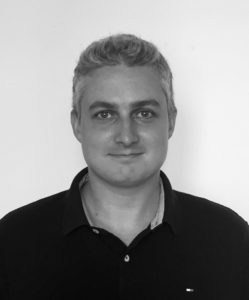 Dr. Maurice Rekrut is a Senior Researcher at the German Research Center for Artificial Intelligence (DFKI). He graduated in Biomedical Engineering at the University of Applied Sciences Saarland (HTW Saarland) with focus on Neural Engineering and received his MSc in 2013. Since then he has been working at DFKI in the cognitive assistants research department. In 2023 he received his PhD in Computer Science under the supervision of Prof. Dr. Antonio Krüger for the thesis “Leveraging EEG-based Speech Imagery Brain- Computer Interfaces”. His research focuses on Brain-Computer Interfaces and their application in real-world scenarios. He is involved in several national und international research projects concerning this topic as for example EXPECT, BISON, NEARBY or HAIKU.
Dr. Maurice Rekrut is a Senior Researcher at the German Research Center for Artificial Intelligence (DFKI). He graduated in Biomedical Engineering at the University of Applied Sciences Saarland (HTW Saarland) with focus on Neural Engineering and received his MSc in 2013. Since then he has been working at DFKI in the cognitive assistants research department. In 2023 he received his PhD in Computer Science under the supervision of Prof. Dr. Antonio Krüger for the thesis “Leveraging EEG-based Speech Imagery Brain- Computer Interfaces”. His research focuses on Brain-Computer Interfaces and their application in real-world scenarios. He is involved in several national und international research projects concerning this topic as for example EXPECT, BISON, NEARBY or HAIKU.
Valentin Seimetz is a Researcher at the German Research Center for Artificial Intelligence (DFKI). He graduated in Computer Science at the Saarland University in 2021. From 2017 on he worked as a Research Assistent and since 2019, he is a researcher in Intelligent User Interfaces group. In the AAL domain, he is involved in the SEMLA project implemententing organizatorial and technichal mesaures for data gouverance and also works in multiple projects like MultiImmerse and Partas.
Former Members:
Ben Hennig (Berlin)
Sabrina Blümling (Berlin)
Christian Husodo Schulz (Berlin)
Dr. Bernd Gersdorf (Bremen)
Christoph Stahl (Bremen)
Gustav Hendeby (Kaiserslautern)
Jochen Frey (Saarbrücken)
Robert Neßelrath (Saarbrücken)
Alexandra Theobalt (Saarbrücken)
Johannes Tröger (Saarbrücken)
Patrick Kapahnke (Saarbrücken)
Kristian Sons ( Saarbrücken)
Janna Herrmann (Saarbrücken)
Nicklas Linz (Saarbrücken)

